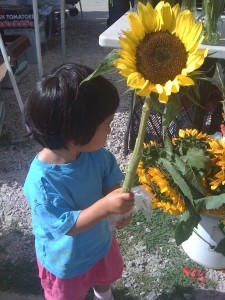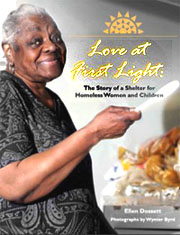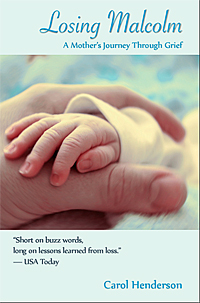Magic in the Garden
 I bit into the apple and spit two hard black dots into my small palm. “What are these?” I asked my father. He told me they were seeds and that we could plant them and they would grow into apple trees.
I bit into the apple and spit two hard black dots into my small palm. “What are these?” I asked my father. He told me they were seeds and that we could plant them and they would grow into apple trees.
We dug two little holes by the back door and dropped one seed in each. We patted the dirt down, and I sprinkled the area with water from our old metal watering can.
What my father didn’t tell me was that we would be moving in two weeks and wouldn’t be around to watch the trees sprout. Still, this is one of my formative memories during those early years when we moved five times in five years.
Children are fascinated by growing things. Michael Pollan, author of “Second Nature: A Gardener’s Education,” remembers his delight in gardening when he was a little boy: “Cradling the globe of a cantaloupe warmed by the sun or pulling orange spears straight from the sandy soil, these were the keenest of pleasures.”
Growing Healthy Kids, part of the Orange County Partnership for Young Children, is a local program that provides young people and their families garden plots so that they can experience the magic of growing fruits and vegetables. Participating families must have a child under the age of 7. Families are required to work in the garden two hours a week, but “required” is hardly the right word. Many families go every day.
“It’s incredibly satisfying to see the excitement in the faces of the children,” says Maria Hitt, project manager. “They’ll dig up a radish or potato plant and see that there’s something growing underneath. They are so proud that they grew it.”
If you visit a local garden you’ll hear at least three languages – Spanish, English, and Karen, spoken by people from Burma. There are currently 38 families with 77 children involved in the program, ranging in age from 6 months to 16 years old. For these kids, whatever their ages, gardening is a passion. A mother told Hitt recently that her young son “cried because I was too tired to take him to the garden and he so wanted to go.”
Basic lessons in sustainability are a byproductParents who work in the restaurant business bring home discarded vegetable waste to add to the community compost rather than throwing it away.
“And each site harvests rain water to irrigate,” Hitt says. “If it doesn’t rain for a few weeks, we’re in trouble.”
The staff teaches the children how to prepare the foods they harvest.
“My hope is that people are learning how to grow their own food,” Hitt says, “and that they’ll be inspired and able to continue to grow food for their families that’s fresh and organic.”
Kids’ eating habits benefit from the experience. The parents say that when their children help to grow it, they will eat foods they never would have touched before.
One of the gardens is at Carrboro Elementary School, another at the site of the future MLK Park on Hillsborough Street, and the third is at the Duke Energy power plant on James Street.
“It’s tricky to keep everything and everybody organized,” Hitt says, “especially when dealing with three languages, three locations, fickle weather, and our three-person staff is all part-time… And we’re facing funding cuts.”
Michael Pollan writes. “We need to use nature without destroying it, diminishing it. Nature and culture can, in the garden, be wedded. In fact I find in the garden some grounds for hope.”
I’m sure everyone involved in the gardens would agree. And, by the way, they always need volunteers. Contact the group at 967-9091 or online at www.orangesmartstart.org.

 I'm happy to be part of this collection of personal stories, a collaboration involving over 60 teachers of memoir from around the world. The book is published independently by the Birren Center for Autobiographical Writing, through which the authors are certified to teach.
I'm happy to be part of this collection of personal stories, a collaboration involving over 60 teachers of memoir from around the world. The book is published independently by the Birren Center for Autobiographical Writing, through which the authors are certified to teach.
 A unique and beautiful exploration of Helen Keller's abiding friendship with prominent journalist Ed Chamberlin–and much more about Keller's struggles, passions, and values. The author is Chamberiin's great-great-granddaughter.
A unique and beautiful exploration of Helen Keller's abiding friendship with prominent journalist Ed Chamberlin–and much more about Keller's struggles, passions, and values. The author is Chamberiin's great-great-granddaughter. On August 8, 2020, in pandemic heat, I introduced Kristen Rademacher (via Zoom)at the launch party for From the Lake
House, A Mother’s Odyssey of Loss and Love, her wrenching memoir. Flyleaf Books, our hopping indie bookstore here in Chapel Hill, NC, hosted the event. A large crowd from across the country and around the world tuned in for the inspiring multi-media event.
On August 8, 2020, in pandemic heat, I introduced Kristen Rademacher (via Zoom)at the launch party for From the Lake
House, A Mother’s Odyssey of Loss and Love, her wrenching memoir. Flyleaf Books, our hopping indie bookstore here in Chapel Hill, NC, hosted the event. A large crowd from across the country and around the world tuned in for the inspiring multi-media event. This poignant memoir gives a boy's view of life in Nazi-held Prague and his escape to freedom in a challenging America.
This poignant memoir gives a boy's view of life in Nazi-held Prague and his escape to freedom in a challenging America. An award winning collection of powerful stories about serving the many needs of elderly and indigent patients, as one of America's first gerontological nurse practitioners.
An award winning collection of powerful stories about serving the many needs of elderly and indigent patients, as one of America's first gerontological nurse practitioners. Essays by women ministers about their challenges and victories in answering the call to ministry.
Essays by women ministers about their challenges and victories in answering the call to ministry. A mother's 40-year struggle to raise an autistic son – and to grow up herself.
A mother's 40-year struggle to raise an autistic son – and to grow up herself. This idyllic memoir recollects the sweet and simple summer pleasures of family life in mid-century Cape Cod.
This idyllic memoir recollects the sweet and simple summer pleasures of family life in mid-century Cape Cod. If you love your pets and make sacrifices for them, you will adore this lively book about a family's needy cats.
If you love your pets and make sacrifices for them, you will adore this lively book about a family's needy cats. The history of a women's shelter in Birmingham, Alabama, as told through many voices.
The history of a women's shelter in Birmingham, Alabama, as told through many voices. William Buffett's short essays on nearly everything, arranged as an alphabet book.
William Buffett's short essays on nearly everything, arranged as an alphabet book. Essays about one man's dimensional life including some of his favorite recipes.
Essays about one man's dimensional life including some of his favorite recipes.
